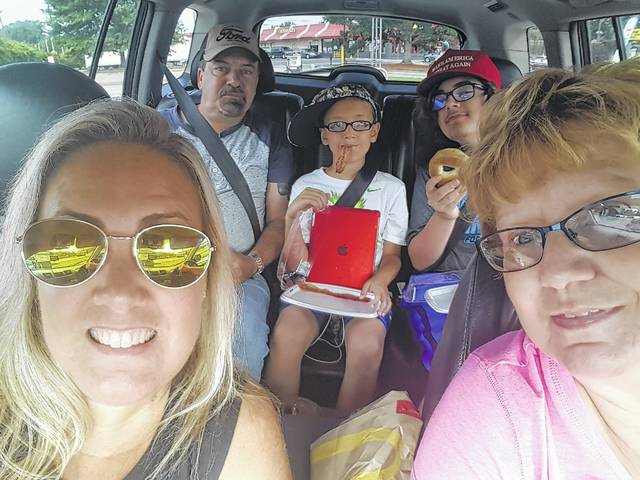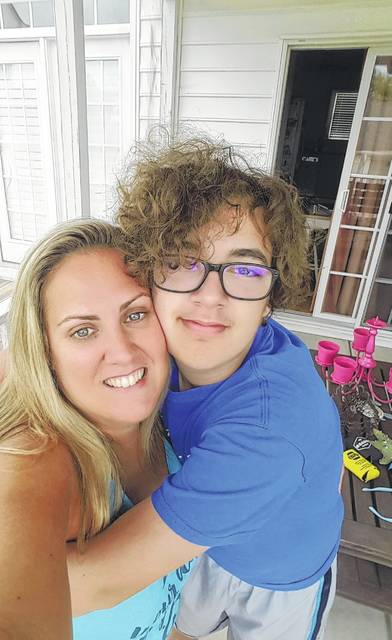

NASHVILLE, N.C. — Ten out of 10.
That’s what Danielle (Rodeheffer) Wooten is hoping for: a perfect match with a lifesaving bone marrow donor in her battle against aplastic anemia.
Wooten, 43, daughter of Tim and Linda Rodeheffer, of Sidney, was first diagnosed with aplastic anemia when she was 24 years old in 1998. Hundreds of people were tested — both family members and friends — but not match was found for a bone marrow transplant. Because no match was found, Wooten received Anti-Thymocyte Globulin (ATG) treatments in April 2000, which caused her disease to go into remission.
On May 23, Wooten was told by her doctor she was out of remission, said Linda Rodeheffer.
“I’ve had four doctor visits in seven days,” Wooten said in a recent phone interview.
While she was in remission, Wooten became as knowledgeable as she could about aplastic anemia. Her main physician after she was diagnosed was Dr. Eva Guinea who works at Children’s Hospital in Boston.
“She agreed to treat me because I was in her early 20s,” said Wooten.
After her initial diagnosis and treatment, Wooten would see her hematologist on a regular basis and follow up appointments with Guinea.
“I started feeling bad last year,” said Wooten. “I went to my yearly appointment and they said nothing was wrong. I started getting B12 because of low iron levels.”
Though she can’t put her finger on what caused the disease to come out of remission, she wonders if it’s tied to a chemical inhalation she had in July 2016.
“Last July I inhaled some pool chemical which had spilled in my car by accident,” she said. “Shortly after that I started to decline. I was seeing a lot of doctors for a lot of things. Then in August/September my (blood) counts were below normal.”
After contacting her doctor, Wooten went to Duke University for tests. Two bone marrow aspirations were done in December.
“I thought it was back because I felt the same way I did the last time,” said Wooten. But the bone marrow aspirations didn’t show any change in the disease.
“I went to a new doctor at Duke in March,” said Wooten. “He thought I was going out of remission. I had two more bone aspirations. He told me in April that I was out of remission.”
While a bone marrow donor is located, Wooten continues her visits to doctors including her hematologist and every other Thursday she goes to Duke to be tested for toxicology levels.
“They make sure I don’t need adjustments on my meds,” said Wooten.
If a donor isn’t found, Wooten has the option for a second ATG treatment. A person can only receive ATG treatments twice in their lifetimes.
She is seeking a second option on her treatment options from physicians at John Hopkins Hospital.
Wooten, the mother of 15-year-old son, Thane, kept the umbilical cord from when she delivered him.
“Your child has half your markers,” said Wooten. “I saved the cord when I had him just in case (I needed it). Duke Hospital has saved it for me.”
One option, she said if a donor isn’t found, is to do a transplant with her son’s cord and to receive a partial transplant from him also.
“We’ll continue to look for a donor match,” said Wooten, who isn’t surprised a match hasn’t been found. “Lots of people don’t have matches. People with odd genealogies have problems finding matches. The doctor is Boston is surprised there hasn’t been a match yet.
“We don’t know why there aren’t any matches,” she said. “There’s no odd genealogy in my family. So I waiting on the donor search and upcoming appointments to decide what to do next.”
Wooten said she is on medications which help with her blood counts.
“Some of my counts are worse and some are better,” she said.
Wooten said receiving a bone marrow transplant is the only cure for aplastic anemia.
“They want me to have a transplant now because in 18 or 19 years from now, I’ll be older and a transplant may not be an option,” she said. “They’ve come a long way in transplants (since she was first diagnosed). There’s more research to look for. Ideally, all 10 characteristics will match — that’s what I don’t have now.”
Wooten said she has talked with her son, Thane, about her disease and what it means.
“He is very a scientific mind for a 15-year-old,” said Wooten. “We talked about it but he doesn’t ask a lot of questions.
“I talked to him about what the doctor told me about a transplant (and Thane being a donor),” she said. “He said, ‘Of course, why wouldn’t I do that.’”
Wooten said he was hard telling her parents the disease was out of remission.
“It’s always harder telling other people than hearing it yourself,” said Wooten. “I didn’t want to tell my mom until I saw the doctor. I knew I was out of remission, but the doctor didn’t know. I had to tell her I was potentially out of remission. I didn’t want to worry her at Christmas. I wanted to tell her after I visited the doctors at Duke.”
While Wooten is searching for answers in North Carolina, her family and friends are rallying around her in Sidney.
“The support from home is very much appreciated but I’m now surprised by it,” said Wooten. “the town (Sidney) is very good when people need something even though I’ve been gone a long time. There’s a lot of support from Sidney — I feel it when I go home and from far away.”
Her parents and friend and classmate Dawn Roberts are spearheading the bone marrow registry drive. Her mom is retired from Shelby County Jobs and Family Services. Her dad is preparing to retire from Honda in Anna. Neither parent, nor her brother, Brad, were matches for a transplant in 1998.
“I was pregnant in 1998 and couldn’t be tested,” said Roberts. “I’ve already sent away for the test and am waiting on the results.”
“Hundreds were tested in 1998,” said Linda Rodeheffer. “All the family was tested and no one was a match. Today, all the relatives who are now 18 have been tested. A sibling would have been best but Brad wasn’t a match.”
Honda, said Rodeheffer, is helping promote the registry among its employees.
The registry drive will be held Saturday, July 22, at Sidney High School from 8 a.m. to 4 p.m. The testing is free for anyone between the ages of 18 and 44 years old.
Rodeheffer has been traveling between Ohio and North Carolina to help Wooten anyway she can. The entire family went for a visit earlier in July.
“We need a bone marrow donor,” said Rodeheffer. “That’s a cure for her. Right now, her red, white and platelet levels are too low.”
Roberts said Wooten didn’t want to tell anyone she was sick again.
“She told me first because she had to tell someone,” said Roberts. “She’s so independent and one of the strongest people I know. She knows what has to be done.”
Wooten was in Sidney for a visit when she, Roberts and Wooten’s brother were out for the evening. Roberts told Wooten she needed to tell her brother what was going on. So on her last night in Sidney, she told her brother that she was out of remission.
“She went back home the next day,” said Rodeheffer. “She called me the next night and said ‘I have something to tell you.’”
“I had told her if you don’t tell your mom, I’m gong to tell her,” said Roberts. “She deserves to know and you need her support.”
Wooten is sharing her journey with aplastic anemia with others who have been diagnosed with the disease.
“I’m a peer counselor with the Apastic Anemia & MDS International Foundation,” said Wooten. “There are many young women who are thinking about getting pregnant when they are in remission. A pregnancy can cause you to come out of remission easily. I didn’t listen to my own advice to them.”
While she continues on her journey to defeat aplastic anemia, Wooten said she is spending time with her son and friends.
“We’re either in the pool or on the beach,” she said. “I also like to go to sporting events. I’m a Cleveland Browns fan.”
Anyone who would like to contact Wooten can do so by writing to: Danielle Wooten, 1584 Spring Pond Road, Nashville, NC 27856.



